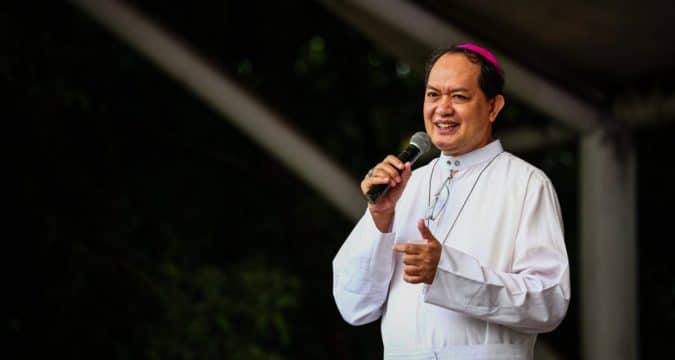
MANILA (Agencies): “We cannot afford to keep quiet when candidates claim the best government we ever had was the Marcos dictatorship … When they claim that martial law was only meant to discipline Filipinos … That it actually improved our economy and provided jobs,” Bishop Pablo Virgilio David of Kalookan told an online forum of the Brotherhood of Christian Businessmen and Professionals on January 15.
Bishop David, the chairperson of the Catholic Bishops’ Conference of the Philippines, rapped recent claims made by supporters of the late dictator, Ferdinand Marcos, that his imposition of martial law was a “golden era” in the country’s history, UCAN reported on January 17.
The claims were made in social media posts as part of a campaign to boost the chances of the late strongman’s son, Ferdinand “Bongbong” Marcos Jr., who is running for president in elections in May.
LiCAS News reported Bishop David as saying that in the mainstream media “we have professional journalists who can immediately react to narratives on the basis of basic criteria of accuracy, truthfulness, factuality. “Well, the same is not the case anymore in social media.”
The bishop blamed martial law for the diaspora of thousands of Filipinos who sought greener pastures through overseas work.
“I wonder if 10 per cent of our population would be working abroad if the dictatorship had not wrecked our economy and caused millions of Filipinos to try their luck abroad even if it meant being separated from their families,” UCAN reported the bishop as telling the online gathering.
Bishop David called for Catholics to speak out when it comes to upholding the truth. He encouraged people to revisit historical accounts to find out the truth about the Marcoses and martial law.
We have to change that narrative that gives those dark years of dictatorship, the loss of freedom and democracy, a semblance of legitimacy. It is not just an alternative narrative but a blatant lie, a misrepresentation of events. It is a falsification of history. It is every bit morally wrong
“Telling the truth about the abuses committed in the past is not slander. This is called rectification. Rectification of historical knowledge. We need to look back the past in the right way,” the bishop said.
“The truth was plain and simple: martial law was simply a democratically-elected leader, wanting to stay in power longer than the Constitution would allow,” LiCAS News reported the bishop as saying.
As we celebrate the 500 years of Christianity in the Philippines. The Chaplaincy to Filipino Migrants organises an on-line talk every Tuesday at 9.00pm. You can join us at:
https://www.Facebook.com/CFM-Gifted-to-give-101039001847033
“Of course, to keep himself in power, he did what dictators normally do. He dissolved Congress, abolished the constitution, had opposition figures arrested, had many protesters jailed and summarily executed, all for the sake of keeping himself in power for another 14 years. So, how could you call that the golden age of Philippine society?” the bishop asked.
He called on Catholics not to remain neutral when faced with lies that attempted to revise history.
“Neutrality allows falsehood to flourish, thereby letting lies and falsehood have the upper hand,” he said.
“We have to change that narrative that gives those dark years of dictatorship, the loss of freedom and democracy, a semblance of legitimacy. It is not just an alternative narrative but a blatant lie, a misrepresentation of events. It is a falsification of history. It is every bit morally wrong,” he said.
UCAN reported that victims of the late dictator have voiced dismay at Marcos Jr.’s presidential bid and have sought his disqualification over his failure to file income tax returns between 1982 and 1985.
Martial law was declared on 23 September 1972 and, although officially lifted in 1981, it effectively lasted until the dictator was ousted in 1986.
The period saw many human rights abuse cases against Marcos’ opponents, which included student and political activists, religious workers and farmers.










